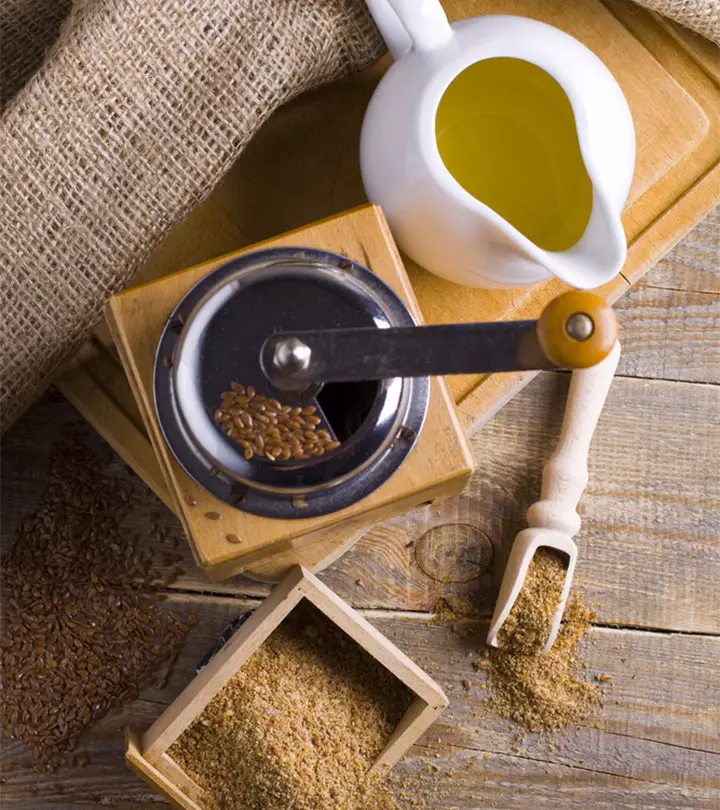The Budwig Diet For Cancer: How It Works, Benefits, & Recipes
Improve your health with this unique diet regimen that helps you fight cancerous cells.

Image: Shutterstock
Amongst the several medical treatments available for cancer treatment is a unique and holistic approach – the Budwig diet. This diet became popular for its claims of supporting cancer treatment by reducing the spread of cancerous cells (1). Though the efficacy of the diet is still not clinically proven, it may help provide a holistic path to a happy, healthy life. In this article, we delve deep into the Budwig diet to help you understand how it works, its benefits, side effects, recipes to follow, and more. Continue reading.
 At A Glance: The Budwig Diet
At A Glance: The Budwig Diet- Principle: Intake of a mixture prepared with flaxseed oil and cottage cheese, which is claimed to keep cancerous cells from spreading
- Purpose: To support cancer treatment, improve heart health, and promote gut health
- Who It Is For: Individuals diagnosed with cancer and people seeking a holistic approach to nutrition
- Duration: Long-term
- Who Should Avoid: Pregnant and breastfeeding women, and those with diabetes, certain hormonal conditions, inflammatory bowel disease, or bleeding disorders
- Cons: May cause diarrhea, gastrointestinal issues, and nutrient deficiencies
In This Article
What Is The Budwig Diet?

The Budwig diet, also known as the Budwig protocol, is a diet developed to supposedly keep cancer cells from spreading. Dr. Johanna Budwig, a German chemist, developed it in the 1950s and claimed that the combination of cottage cheese and flaxseed oil may help improve cellular functioning and potentially destroy cancerous cells. The diet plan prescribes multiple servings of a mixture prepared with cottage cheese and flaxseed oil, along with other healthy foods like fruits and vegetables. It also eliminates added sugars, processed meats, refined grains, and hydrogenated oils.
 Trivia
TriviaAlthough the diet was originally developed to aid cancer treatment, there is not enough research to prove its efficacy. However, in a study on the components of an anticancer diet, there are a few interesting observations about Budwig’s research on the benefits of consuming flax seeds and cottage cheese in improving cellular metabolism (1). Read on to know how the diet works.
Key Takeaways
- The Budwig diet is a dietary approach developed in the 1950s to support cancer treatment.
- It may support heart health, protect cognitive health, and promote gut health.
- The diet emphasizes the intake of healthy fats and foods high in antioxidants like fresh vegetables and cottage cheese.
- It encourages the intake of multiple daily servings of the Budwig diet mixture and the elimination of processed foods.
How Does The Budwig Diet Work?
Budwig observed that cancer patients needed polyunsaturated fatty acidsi Fatty acids essential for brain and cell growth that the human body cannot produce on its own and must obtain from the diet (PUFAs) like linoleic acid (LA) and linolenic acid (LNA) to make cell membranes and support cellular respiration. Diets that lack these fatty acids limit chemical reactions and create a low-oxygen environment. This may hinder cellular metabolism. Budwig’s diet included flaxseed oil that is rich in the aforementioned fatty acids. When combined with sulfhydryl groupsi A group of atoms or bonds with a sulfur atom bonded to a hydrogen atom that are present in the protein structure of cottage cheese from cottage cheese, these fatty acids are believed to release stored energy and improve oxygen levels. Budwig’s theory also claimed that highly unsaturated fatty acids could speed up cell division and cause the cancerous tumors to self-destruct (1).
Therefore, you are encouraged to consume at least 2 ounces of flaxseed oil and 4 ounces of cottage cheese per day. You may consume these along with some amount of honey for taste (optional).
 Did You Know?
Did You Know?The diet also involves the intake of healthy fruits and vegetables and eliminates processed fats. Therefore, it can offer several health benefits. Scroll down to learn about all the potential health benefits of the Budwig diet.
Benefits Of The Budwig Diet
May Reduce Cancer Risk
Although no study has been conducted on the Budwig mixture, a few test tube and animal studies prove the effectiveness of using flaxseed oil to reduce cancer risk. In a study published in Molecular Nutrition And Food Research, the use of flaxseed oil was found to reduce the risk of human breast tumors. The alpha-linolenic acidi An essential omega-3 fatty acid found in plant-based foods that is beneficial for its anti-inflammatory properties in flaxseed was found to help reduce the risk of breast cancer in mice (2). Another study on rats showed that flaxseeds may help suppress cancer as they may potentially slow down the early growth of cancer cells and maintain the normal level of mucus-secreting cells (3). However, more research is needed to understand the efficacy of flaxseed in humans.
May Improve Heart Health

One tablespoon of flaxseed oil contains 7.24 g of ALA (4). This high ALA may help slow down the progression of heart disease conditions caused by dietary trans fat, including atherosclerosisi A medical condition caused by the buildup of fatty deposits, cholesterol, calcium, and other substances within the walls of arteries (thickening of the arteries) (5).
May Aid In Brain Development
Omega-3 fatty acids help modulate behavior and mood and may aid in improving one’s cognitive functioni The mental processes and abilities that allow individuals to acquire, process, store, retrieve, and use information (5). Taking flaxseed oil supplements was found to have an impact on the psychological well-being of women with depression. These supplements were also found to be associated with brain-derived neurotrophic factor (BDNF), a specific protein that helps in the growth, development, and maintenance of nerve cells in the brain and the nervous system (6).
May Improve Gut Health
Several foods consumed in the Budwig plan are a part of the anti-inflammatory diet that improves gut health. For instance, cottage cheese, a major ingredient in the Budwig diet, may help improve gut health as it helps gut bacteria grow and thrive (7). Gut bacteria help promote gut health and digestion. Moreover, dairy products like yogurt possess anti-inflammatory properties that help treat symptoms of inflammatory bowel disease (8).
May Improve Skin Health
Flaxseed oil supplementation may help reduce skin sensitivity, smoothen the skin, decrease roughness, lessen scaling, and enhance skin hydration (6). The omega-3 fatty acids in the oil may also promote wound healing. In a study, supplementation with 1000 mg of omega-3 fatty acids from flaxseed oil, twice daily for 12 weeks, was found to reduce both the length and depth of skin ulcers in patients with diabetic foot syndromei A collection of several complications that can develop in the feet due to prolonged and poorly controlled diabetes (6).
This mixture can be prepared with simple ingredients and steps, and can help improve your health in several ways. Continue reading to learn how you can prepare the Budwig diet mixture.
The Budwig Diet Mixture Recipe

Ingredients
- 2 tablespoons of freshly crushed flaxseeds
- 3 tablespoons of flaxseed oil
- 6 tablespoons of cottage cheese
- 2 tablespoons of semi-skimmed organic milk (goat or sheep milk)
- 1 teaspoon of raw honey
How To Prepare
- Mix two tablespoons of low-fat milk and three tablespoons of flaxseed oil in an electric blender.
- Add one teaspoon of honey and mix all the three ingredients well.
- Slowly add the two tablespoons of cottage cheese and keep mixing until it is combined well.
- You may add up to 6 tablespoons of cottage cheese.
- Put the freshly crushed flaxseeds in a separate bowl.
- Pour the mixture of cheese, honey, and oil over the freshly ground flaxseeds.
- You may top the mixture with some blueberries, almonds, pumpkin seeds, or Brazil nuts.
 Pro Tip
Pro TipThough this mixture is the main component of the diet, you may also have to follow other eating protocols while you are at it. Continue reading to learn what other foods you should consume while you are on the Budwig diet.
Foods To Eat On The Budwig Diet
The Budwig Diet focuses on the intake of healthy fats, antioxidant-rich foods like fresh fruits and vegetables, high-fiber foods, and fermented dairy products.
In addition to flaxseed oil and cottage cheese, individuals are encouraged to consume other foods like:
- Fruits: Apples, mango, kiwi, plum, oranges, berries, bananas, and peaches
- Vegetables: Cabbage, broccoli, cucumbers, carrots, tomatoes, spinach, and kale
- Legumes: Beans, peas, chickpeas, and lentils
- Nuts And seeds: Flaxseeds, almonds, hemp seeds, chia seeds, walnuts, and pistachios
- Dairy Products: Yogurt, cottage cheese, oat milk, goat milk, raw cow milk, and almond milk
- Oils: Olive oil and flaxseed oil
- Beverages: Herbal tea and green tea
These foods can be easily incorporated into your daily diet. In the next section, find a sample guide for making meal planning easier.
Sample Meal Plan
This is a sample of a meal plan that can help you stick to the Budwig Diet:
- Breakfast: Budwig mixture with berries
- Lunch: Mixed salad with olive oil and vinegar
- Snack: A handful of nuts
- Dinner: Grilled vegetables with quinoa.
You may experiment with other food ingredients mentioned earlier to make your diet more flavorful. Budwig recommended incorporating healthy, fresh foods instead of processed foods. Now, read on to learn more about the foods you should limit or avoid in this diet.
Foods To Avoid On The Budwig Diet

The Budwig diet is mainly a plant-based diet with the addition of some dairy products. So, apart from them, you need to avoid the following on this diet plan:
- Meat And Seafood: Pork and shellfish
- Processed Meats: Salami, hot dogs, bacon, and bologna
- Refined Grains: Pasta, white rice, chips, crackers, and white bread
- Sugars: Table sugar, brown sugar, molasses, agave, and corn syrup
- Soy Products: Soybeans, soy milk, edamame, tofu, and tempeh
- Fats And Oils: Hydrogenated vegetable oil, margarine, and butter
- Processed Foods: Cookies, baked goods, candy, French fries, convenience meals, and pretzels
While the Budwig diet seems to offer important benefits it’s not rigorously tested in scientific studies. Therefore it also may pose certain risks. Learn more about them in the next section.
While the Budwig diet seems to offer important benefits, it also may pose certain risks. Learn more about them in the next section.
Side Effects And Risk Factors Of The Budwig Diet

Flaxseeds contain high amounts of dietary fiber (6). Heavy intake of the oil extracted from them may cause diarrhea or frequent bowel movements. Excess fiber intake may also cause other gastrointestinal problems like constipation or intestinal blockage (9). Moreover, flaxseeds may also interact with other pain relievers and certain drugs meant for bleeding disorders, diabetes, and high blood pressure (10).
People with an intolerance to dairy products may experience allergies from eating cottage cheese. Besides, the diet restricts some foods that may be necessary for a balanced meal. This could cause nutrient deficiencies in some people. Hence, keep an eye on your nutritional intake and consider taking supplements to keep your diet balanced and your health in check, if needed. Incorporating all necessary vitamins and minerals into your diet can help reduce these risks and promote general health while adhering to the diet. The restrictive nature of the diet may also lead to severe weight loss. Therefore, it is best to consult a doctor before starting this diet to understand if it is right for you. Keep reading to learn who needs to avoid this diet.
Who Should Not Follow The Budwig Diet?
- Pregnant or breastfeeding women
- Individuals with diabetes
- Individuals with certain hormonal conditions like hot flashes or irregular periods
- Individuals with inflammatory bowel disease
- Those with bleeding disorders
That said, even healthy individuals are recommended to first consult their doctor before embarking on the Budwig Diet. It is important to get a customized meal plan that suits one’s lifestyle and goals.
The Budwig diet was developed by Dr. Johanna Budwig with the aim to support cancer treatment. It emphasizes the intake of a mixture made from cottage cheese and flaxseed oil, which, she argued, could potentially help prevent the spread of cancerous cells. The diet program also encourages the consumption of healthy foods while eliminating highly processed foods and other unhealthy dietary choices. Despite anecdotal claims of success and testimonials from followers, scientific evidence supporting the Budwig diet’s efficacy in cancer treatment is lacking. Also, the heavy consumption of flaxseeds and their oil may cause side effects like bloating, diarrhea, and drug interactions. Therefore, it is advisable to consult your doctor before starting this diet.
Frequently Asked Questions
How long can I follow the Budwig diet?
You can adhere to the diet as long as your health improves. After that, you may consider adjusting or discontinuing the diet upon consulting a healthcare professional.
What are the alternatives to the Budwig diet?
There are no specific alternatives to the Budwig diet. But you can consult your doctor and get a customized diet plan based on the medications you take and the stage of your treatment.
What is the difference between the Budwig diet and the macrobiotic diet?
The Budwig diet, though developed to support cancer treatment, may be used to improve your overall health. On the other hand, the macrobiotic diet specifically aims to limit foods that contain toxins to help you lead a balanced, toxin-free life.
The Budwig diet is a holistic dietary approach invented by Dr. Johanna Budwig to help people diagnosed with cancer. It encourages the consumption of a simple mixture that can potentially help individuals address other health issues as well. Watch this informative video to learn how to prepare the Budwig diet mixture that comprises flaxseed oil and cottage cheese.
References
Articles on StyleCraze are backed by verified information from peer-reviewed and academic research papers, reputed organizations, research institutions, and medical associations to ensure accuracy and relevance. Read our editorial policy to learn more.
- Components of an anticancer diet: dietary recommendations restrictions and supplements of the Bill Henderson protocol
https://www.ncbi.nlm.nih.gov/pmc/articles/PMC3257729/ - Flaxseed oil reduces the growth of human breast tumors (MCF-7) at high levels of circulating estrogen
https://pubmed.ncbi.nlm.nih.gov/20425756/ - Cancer chemopreventive potential of the Egyptian flaxseed oil in a rat colon carcinogenesis bioassay–implications for its mechanism of action
https://pubmed.ncbi.nlm.nih.gov/22296388/ - The cardiovascular effects of flaxseed and its omega-3 fatty acid alpha-linolenic acid
https://www.ncbi.nlm.nih.gov/pmc/articles/PMC2989356/ - Dietary flaxseed as a strategy for improving human health
https://www.mdpi.com/2072-6643/11/5/1171 - The role of flaxseed in improving human health
https://www.mdpi.com/2227-9032/11/3/395 - Probiotic-enriched milk and dairy products increase gut microbiota diversity: a comparative study
https://pubmed.ncbi.nlm.nih.gov/32949953/ - Anti-inflammatory effects of probiotic yogurt in inflammatory bowel disease patients
https://www.ncbi.nlm.nih.gov/pmc/articles/PMC2219330/ - Flaxseed and flaxseed oil
https://www.nccih.nih.gov/health/flaxseed-and-flaxseed-oil - Adverse events associated with interactions with dietary and herbal supplements among inpatients
https://www.ncbi.nlm.nih.gov/pmc/articles/PMC5346861/
Read full bio of Karin Littleton
Read full bio of Shreya Mukherjee
Read full bio of Ravi Teja Tadimalla
Read full bio of Gazala Firdos Ansari





















Community Experiences
Join the conversation and become a part of our empowering community! Share your stories, experiences, and insights to connect with other beauty, lifestyle, and health enthusiasts.